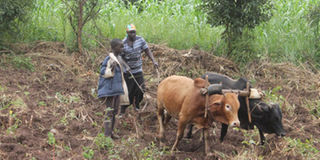Kiryandongo farmers stranded amid probe over ghost members

Farming. Ms Gloria Laker, a member of Rubanga-twero Women’s Empowerment group, clears her farmland using ox-plough. Kiryandongo farmers stranded amid probe over ghost members. PHOTO | FILE
What you need to know:
- Mr Peter Debele, the Kiryandongo Resident District Commissioner, said the investigation started in July when the district security committee and the internal auditor realised that there was fraud in handling of the funds.
Farmers in Kiryandongo District have failed to plant crops due to delay to release funds from Northern Uganda Social Action Fund phase three (NUSAF 3).
The release of Shs2.1b to 79 groups registered to benefit from NUSAF 3 was halted after the Inspectorate of Government (IGG) began investigating alleged fraud. The money was meant for the purchase of seeds and ox-ploughs.
The director of Project Risk Monitoring and Control in the IGG, Mr James Penywii, told Daily Monitor in an interview at the weekend that his office received a complaint from the Kiryandongo chief administrative officer (CAO), Ms Dorothy Agwang, requesting an investigation into alleged ghost group members and fake signatories on bank accounts of the beneficiary groups.
“The CAO accused the groups of having ghost members and signatories and directed Stanbic Bank not to allow any withdraw of the money until the matter is investigated,” Mr Penywii said last Friday.
He added: “We shall make a report for the district before funds are distributed to members.”
Mr Penywii said the IGG would later recommend appropriate action to be taken.
Mr Peter Debele, the Kiryandongo Resident District Commissioner, said the investigation started in July when the district security committee and the internal auditor realised that there was fraud in handling of the funds.
Ms Ali Munira, the head of communication at the IGG, said they would expedite the investigation because the beneficiaries are late for the planting season.
“We don’t want these people to miss. We know the season is late but if they receive the money they agreed to first buy ox-ploughs as they wait for the next season,” Ms Munira said.
Ms Agwang said she directed that an internal audit be carried out by the district auditor because there were a number of inconsistencies.
According to the NUSAF 3 guidelines, by June 31, the money for the project should have been spent on the beneficiaries and accountability submitted to the Office of the Prime Minister.
“If this money is taken back, we have nothing to do because it will go directly back to the account of the World Bank who funded the project,” Mr Pinywiri said.
Mr Omiti Kagi, the chairperson of one of the beneficiary groups in Rwamutete Village in Kigumba Town Council, asked government to avail funds so that they can buy farm equipment and planting materials to use as investigations continue. “Because the season has gone well, we prepared the gardens, let government give us money to buy oxen as they investigate,” he said.
About the project
Benefits. The World Bank project has a development objective to provide effective income support and build the resilience of poor and vulnerable households in northern Uganda. The project comprises four components that include labour-intensive public works and disaster risk financing that provides beneficiaries from poor and vulnerable households with a seasonal transfer for multiple years in return for their participation.
Another component is livelihood investment support to increase their productive assets and incomes. The third component is strengthening transparency, accountability, and anti-corruption while the fourth component is safety net mechanisms, and project management which consist of following two sub-components: (i) safety net mechanisms; and (ii) project management.




